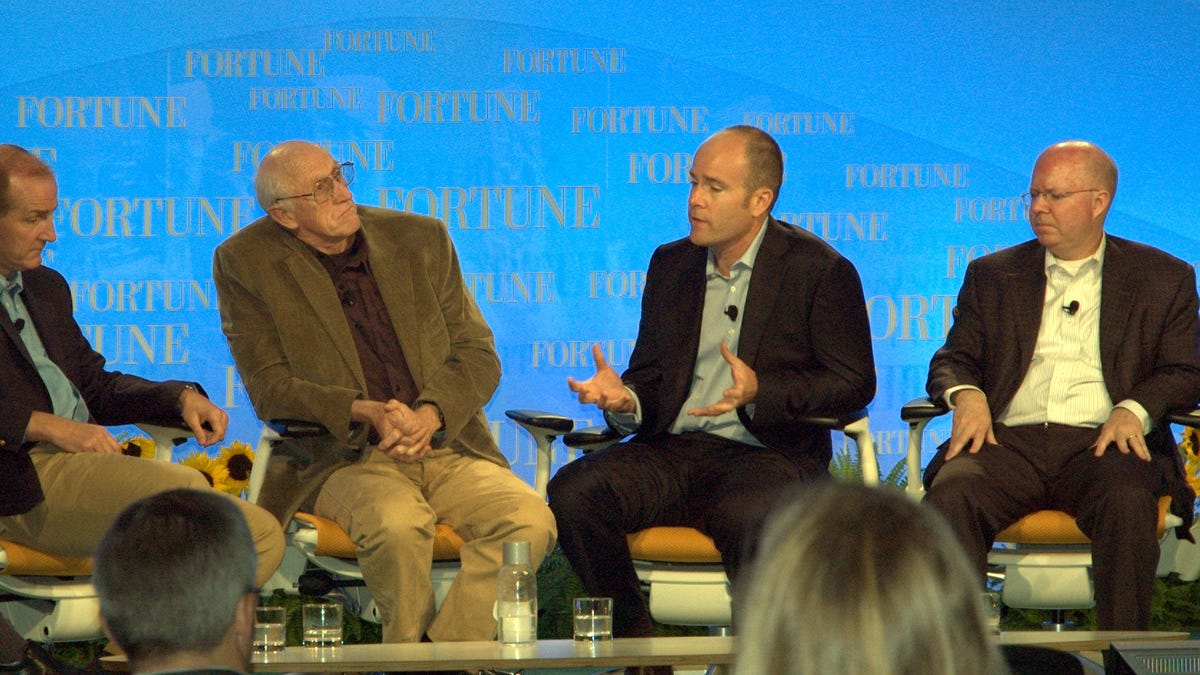Nuclear power: Friend or foe to renewable energy?
In the discussion over the direction of clean energy, solar and wind figure heavily but now nuclear power is increasingly proposed as a complement to renewable energy.

LAGUNA NIGUEL, Calif.--As renewable energy gains steam, environmentalists are increasingly being asked whether to support their longtime enemy: nuclear power.
At the Fortune Brainstorm Green conference here, nuclear power has frequently entered the discussion over the future of clean energy. Prompted by government policies, utilities are investing in wind and solar power but there are limits to what renewable power can do, say people in the industry.
When environmentalists say that clean energy can supply all electricity needs in the near future, they're being idealistic, said David Crane, the CEO of utility NRG Energy, which has invested in solar and wind, but is seeking to build a nuclear power plant in Texas. Compared to carbon capture and underground storage at coal plants, nuclear is more mature, he said.
"For people who want to deal with realism, ask yourself what does a utility CEO do when the lights go out and the governor of the state calls you yelling and screaming," he said during a panel on Tuesday. "I'm not against renewable but you got to keep all of this in proportion. We need low-carbon or no-carbon baseload generation in this country."
Wind and solar power are intermittent, which means that they do not provide electricity continuously. Nuclear power plants can work round the clock and don't have carbon emissions during operation, which is the primary reason that environmentalist Stewart Brand now backs nuclear.
There is also the issue of cost. Nuclear, wind, and solar are all more expensive than generating electricity with natural gas at its current prices, said Crane. But if government policies do not include support for nuclear power, such as loan guarantees, then utilities will move to natural gas because it is less polluting than coal. But a spike in demand will drive up prices from $4 per million BTUs, which is where it is now, panelists said.
"Renewables could get to 20 or 30 percent of generation (from about 2 percent now) and we can get there affordably. But if you take nuclear out of the equation, the choice is not 50 percent renewable, the choice is taking natural gas to 40 or 50 percent," said James Connaughton, executive vice president for corporate affairs, public affairs, and environmental policy at utility Constellation Energy.
In the U.S. there are 26 proposals to build new power plants to meet growing electricity demand and three are in the running for government loan guarantees, said Connaughton. He projects a "symbiosis" between nuclear, natural gas, and renewable in the decades ahead where scaling up each power source will lower costs.
Environmental group the Sierra Club "enthusiastically" opposes nuclear power for a number of reasons, including its high cost, risks of handling nuclear waste, and risk of proliferation of weapons, said Michael Brune, the executive director of the Sierra Club.
"I can understand why we are having this conversation," he said. "But the only reason to invest in nuclear power is because we tried it before, because we know it can work. That's not a compelling reason, we need to rise to a challenge as a species, as a country."
By contrast, representatives from other environmental groups, the Environmental Defense Fund and the Natural Resources Defense Council, said on Monday that they were not totally opposed to additional government incentives for nuclear power.
Those groups expected that an energy and climate bill--now being crafted by the Senate--would include support for nuclear but not a huge expansion because of the costs, waste disposal, and proliferation risks of nuclear, said Frances Beineke, the president of the Natural Resources Defense Council. Nuclear, which now accounts for about 20 percent of power generation in the U.S., cannot get to 50 percent, as coal does now, because of cost, she said.
Solar, wind cheaper than nukes?
Policy questions aside, there is still an ongoing question over what the impact of technology improvements can have on the adoption rate of solar and wind, compared to other potential sources.
Bill Gross, the CEO of solar thermal company eSolar, is optimistic that solar can generate 20 percent of electricity in the U.S. by 2020, but it will only happen with lower costs. eSolar makes equipment for solar power plants using computer-controlled mirrors which create heat that makes steam to run an electricity turbine
"We're focused on price and to be competitive with solar thermal you need to focus on higher capacity factor (of how often a solar system can generate electricity). It's very hard to store electrons. It's easy to store heat so we can get a capacity factor of 60 to 65 percent," he said.
Oil giant BP has diversified into alternative energy because it sees a growing demand for energy across the world in the next 20 years. It has decided to focus its efforts on biofuels, solar, wind, and carbon, capture, and storage.
"We believe that onshore wind and solar PV (photovoltaics) can compete and are much more cost-competitive with nuclear or perhaps carbon capture and storage at this time given its newness," said Katrina Landis, the CEO of BP's Alternative Energy division.
Which one will scale up quickest? "It depends on government support. Governments need to be very clear on the rules and the rules need to be lasting," she said.

